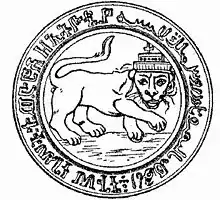Negus
Negus (Ge'ez: ንጉሥ, nəgueś [nɨgueɬ]; cf. Amharic: ነጋሲ negus [negus]) is a title in the Ethiopian Semitic languages.[1] Which was usually bestowed upon a regional ruler by the Negusa Nagast, or "king of kings"[2] in pre-1974 Ethiopia. The negus is referred to as Al-Najashi (النجاشي) in the Islamic tradition.

Overview
Negus is a noun derived from the Ethiopian Semitic root ngś, meaning "to reign". The title has subsequently been used to translate the word "king" or "emperor" in Biblical and other literature. In more recent times, it was used as an honorific title bestowed on governors of the most important provinces (kingdoms): Gojjam, Begemder, Wello, Tigray and the seaward kingdom, (where the variation Bahri Negasi (Sea King), was the title of the ruler of present-day central Eritrea). The military title "Meridazmatch" was initially used by the rulers of Shewa until the reign of Sahle Selassie, when he and his successors adopted the royal title as well.[3][4]
See also
References
- Haile Selassie, Western Education, and Political Revolution in Ethiopia. Cambria Press. ISBN 9781621969143.
- Negus. Amharic nəgus, from Geez nĕgūša nagašt king of kings. First Known Use: 1594 Merriam Webster dictionary
- Mussie Tesfagiorgis G. Ph.D. (29 October 2010). Eritrea. ABC-CLIO. pp. 34–35. ISBN 978-1-59884-232-6.
- Alemseged Abbay (1998). Identity Jilted, Or, Re-imagining Identity?: The Divergent Paths of the Eritrean and Tigrayan Nationalist Struggles. The Red Sea Press. p. 202. ISBN 978-1-56902-072-2.